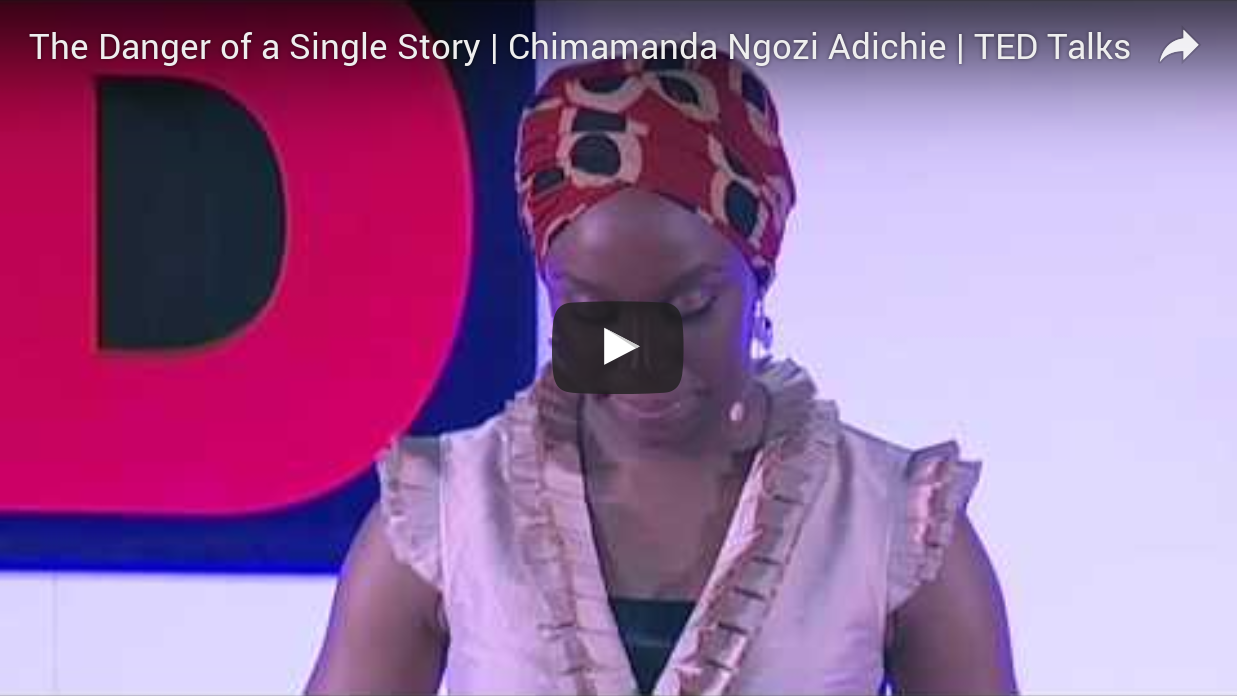Chimamanda Ngozi Adichie and David Brooks on the Dangers of Single Storyism
New York Times columnist David Brooks offered his readers a gift, recently, when he pointed out a 2009 TED Talk by Nigerian writer Chimamanda Ngozi Adichie called “The Danger of a Single Story.” In that talk, Adichie discusses globalization, colonialism, and the mutual cross-cultural misperceptions brought about – as Brooks puts it – by what happens when complex human beings and situations are reduced to a single narrative.
She talks, too, about coming to college in the United States and finding herself on the receiving end of the single-story problem: a roommate who felt sorry for me even before she saw me because she had only a single story of Africa – catastrophe; and the power of a narrative that left no possibility of Africans being similar to her in any way, no possibility of feelings more complex than pity, no possibility of a connection as human equals.
The stories Adichie tells us are personal, but the problem, she says, is political. Single stories about peoples or places are tools by which those with power control how we understand and interact with those without:
Power is the ability not just to tell the story of another person, but to make it the definitive story of that person. The Palestinian poet Mourid Barghouti writes that if you want to dispossess a people, the simplest way to do it is to tell their story and to start with, “secondly.” Start the story with the arrows of the Native Americans, and not with the arrival of the British, and you have an entirely different story. Start the story with the failure of the African state, and not with the colonial creation of the African state, and you have an entirely different story.
In other words, how we frame stories – what parts we choose to tell and which we omit – is an exercise in turning complexity into simplicity. And that simplicity, often as not, comes at somebody else’s expense.
David Brooks rightly connects this idea, which he calls single storyism, to the current state of American politics. Donald Trump and Bernie Sanders are the giants of single storyism, he tells us, reducing the complexities of the American political landscape to simple narratives: the perils of the other in the case of Trump, and the tyranny of the banks for Sanders.
Both candidates, says Brooks, have gained in power by erasing those narrative threads that are messy or that don’t easily fit. And both are part of a larger political problem that’s connected to civility: that partisanship limits our ability to understand how multiple narratives about issues from the minimum wage to police brutality may simultaneously be true.
But while Brooks starts us down the right road with his use of Adichie’s TED talk, he doesn’t quite get to the larger point. Adichie tells us:
It is impossible to engage properly with a place or a person without engaging with all of the stories of that place and that person. The consequence of the single story is this: It robs people of dignity. It makes our recognition of our equal humanity difficult. It emphasizes how we are different rather than how we are similar.
The value of multiple narratives – about a group, from members of a group, from multiple members – is that the stories begin to form a web, offer us three-dimensionality, and tell us not just who people are and what they do, but that they are not easily reducible to a single, simple essence.
This is dignity in a nutshell. And it is also the core of civility.
Civility asks us to take others seriously – to see our neighbors not as props in the drama of our lives, but as fully realized individuals with identities, needs, and beliefs that must be accommodated, even as we would like to see our own identities, needs and beliefs accommodated.
When David Brooks offers an indictment of the single storyism of only being able to see a policy issue from one point of view, part of the problem he is identifying is practical. How can we balance competing goods, whether they are the needs of labor and management, or the needs of communities and law enforcement?
But that in itself is a kind of single storyism. Our policy positions and political opinions only represent part of the many narratives that encompass each of us as individuals, and each of our groups. And while the immediate concern may rightly be about making laws, Chimamanda Ngozi Adichie’s talk shows us that civility is about something else: the question of how we can break through simplicity and embrace complexity as a tool that allows us to productively and peacefully coexist.

